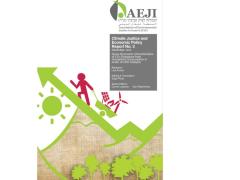
This paper is a summary of a research conducted in the framework of a multiannual research and policy project on Climate Justice by the Association of Environmental Justice in Israel (AEJI), and it aims to estimate the climatic impact of domestic consumption by households in Israel (in CO2 terms); and to examine the variance between consumption patterns of different socio-economic groups according to income deciles, and their respective influence over quantities of GHG emissions to the atmosphere. The study examines the significance of demographic characteristics and consumption habits of households in assessing CO2 emissions, by means of an Environmental Input-Output (EIO) Analysis. The EIO analysis provides a model for investigation of the relationship between both direct and indirect energy consumption (indirect consumption being the consumption of embodied energy in different products) of households and their expenditures.
The research results indicate that total average household emissions, including direct emissions from the consumption of energy products and indirect emissions from the consumption of products and services, is approximately 5 ton CO2 per person per annum, ranging by income deciles between 2.7 and 7.8 tons CO2 per person per annum. A significant variance is evident in the "emissions basket" (composition of emission sources) of households, differing between deciles. In low income households, most emissions emanate from consumption of basic products, such as food and electricity, which have a high emission coefficient. On the other hand, high income households consume more products and services that can be classified as luxuries, such as entertainment and education services, and have a lower emission coefficient.
Another study by Ro'ee Levy, in the framework of the Climate Justice Research and Policy Project, discusses the need to impose a carbon tax as a means of reducing GHG emissions in the Israeli economy, while taking measures to rectify the regressive impacts of such carbon pricing. The outcomes of the present research reinforce the importance of such correction policies, considering that carbon taxation would be a higher toll for low income households, compared with consumers from a higher socio-economic group.

